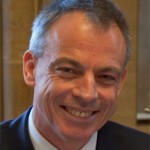More than 350 million people worldwide are living with a rare disease, and approximately 50 percent of those are children.
Here, our Fellow Matthew Wood, a Professor of Neuroscience in the Department of Paediatrics, describes his work and the advances that a new Rare Diseases Centre – announced this week by the University of Oxford and Harrington Discovery Institute at University Hospitals – could herald for the future of rare disease and genetics.
Can you tell us a bit about your work?
Originally, I trained in medicine and neuroscience and neurology, and my own research over the last 20 years has been into the development of new genetic therapies for rare disease of the brain and muscle — diseases we refer to as neuromuscular diseases.
What are your motivations?
For my own work, my motivations are twofold.
One is purely scientific. Rare diseases are typically genetic diseases and therefore understanding how genetic defects lead to a particular disease, and how these defects can be optimally repaired or corrected is a major scientific challenge, but one, that with all our current technologies, is entirely achievable. The scientific and intellectual challenge is a major motivation, and the fact that we can make major progress is very satisfying.
The second aspect is more personal. I have at least one family member with a rare disease, and knowing particular people with such a disease is a major motivation. A huge motivation for me is meeting patients and being able to turn our scientific knowledge and progress into something that can make a tangible difference to their lives!
What does a day in your life look like?
One of the most exciting things about my work and current roles is that no two days are the same, and that innovation is highly rewarding.
A day might range from working with my own research team on a project to develop and test a new treatment for a rare disease we are working on, to working with funding agencies to support our work, to meeting with patient organisations and patients — directly helping them to understand what we are doing scientifically and how it could make a difference for them and understanding their needs.
Read the full interview here.
